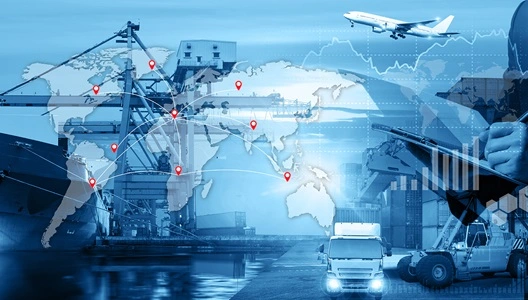Let’s say you walk into a supermarket in the United States to buy some juicy mango, and then you come to find out that those mangos you ate actually came from all the way to India. Before international trade was even a thing, you could not have even thought of enjoying such juicy mangos, if so, you’d have to go to India. But that’s the magic of International trade. And it is not just mangos that international trade makes us enjoy, nah, there are a whole lot of commodities and products that are being traded as per the international trade agreements between many nations across the world.
So, for sure, international trade is a must, and that’s something we can’t even imagine our day-to-day life because that’s the way we get many daily use products. But did you know there are a whole lot of challenges with international trade too? Yes! And if you really want to know a bit more about this, then keep on reading this post where we have shared the advantages and disadvantages of international trade. Alright, here we go.

Advantages of International Trade
1. Mastering What You Do Best
Trade on a global scale allows you to have it both ways. What and how? Well, countries can trade for goods they need while focusing on their strengths, for example, some countries produce abundant vegetables while others produce oil. It goes like this: a country rich in oil concentrates on oil, while a country with miles of farmland continues to farm. This not only makes the most of their strengths but also significantly increases their output.
2. The World is Your Shopping Cart
Among the most exciting advantages of global commerce is that it makes the entire world seem like a huge mall. Countries may import everything they don’t have locally, whether it’s rare foods or cutting-edge technology. All in all, diversity isn’t only cool, it greatly improves people’s quality of life.
3. Go Big or Go Home
So here’s the thing you see, nations can really let their output levels soar when they trade worldwide. This allows them to disperse the substantial expenses of things like manufacturing and research and development among a large number of goods. So, what’s the verdict? Everybody wins with cheaper pricing per item: producers save money, and we (customers) receive lower price tags.
4. Unexplored Markets for Your Goods
Businesses, particularly smaller ones yearning to escape their local settings, might think of international trading as a ticket to the big leagues, you know? Businesses may increase their consumer base and generate more revenues by exploring international markets. And yes, back home, this translates to a thriving economy, more employment opportunities, and more cash in the bank, and why not?
5. Keeping Prices in Check
Trade between countries acts as a price stabilizer. Bringing in goods from regions with excess and sending them out to places with a shortage is all about finding a happy medium. In this manner, surplus or scarcity won’t cost anyone a fortune. The people producing goods and those purchasing them both benefit from this very price stability.
6. Raising the Bar on Quality and Innovation
When small firms feel pressured to compete on a global scale, that’s when things become interesting. In order to keep up with their worldwide competition, businesses are always releasing improved products and new ideas. Not only does this keep the economy moving forward quickly, but it also means that the items we buy will be cooler and more effective.
7. Trading Insights
International commerce is fantastic at exchanging knowledge and technology across countries, in addition to just commodities and gadgets. It is often seen in international trade that the more advanced nations often share their secrets and cutting-edge technology with the developing nations.
Disadvantages of International Trade
1. Rapid Depletion of Natural Resources
It is no hidden secret that natural resources, such as oil, minerals, or abundant wood, can be quickly depleted when countries sell them, and that’s the worst part about International trade as a whole.
2. Local Industries Take a Major Hit
You see, our true hometown heroes, like hard working farmers, have it tough when faced with floods of imported commodities that are both cheaper and more plentiful. Businesses may close their doors and jobs may be lost as a result, which would undermine our economy and cause financial instability.
3. Economic Dependence Dilemma
Putting all your money into overseas trade is a dangerous move, all in all, you can’t afford to be careless! Overly export-dependent nations are vulnerable to the ebb and flow of international politics and markets. Consider an oil-exporting country: its economy may collapse under the weight of new trade restrictions or a drop in global oil prices super quickly.
4. The Dirty Game of Dumping
In an effort to clear off surplus stock or gain a foothold in new markets, some nations engage in dumping, which involves selling their goods overseas at ridiculously low costs. Because they can’t compete with such low pricing, local firms in the nations that import them may suffer a crushing blow. What’s the outcome though? Businesses go, local markets decline, and employment opportunities vanish.
5. Cultural Washout
The flood of foreign goods and services brought in by international commerce threatens to suffocate indigenous or cultural practices and goods. Imagine a world where international fast food chains are mushrooming up all over the place, displacing the long-established, family-run restaurants that formerly thrived there.
6. Navigating a Legal Maze
Doing business on a global scale is like navigating a literal maze of rules and regulations. It may be quite a challenge to stay up with the norms and standards set by each country. Disagreements can cause delays in transactions and increase expenses due to variances in safety requirements and quality inspections.
Conclusion
There you have it. International trade is for sure a gift to humanity, and only we humans can take credit for that because we have found the workarounds for that. So yes, it is something we’d have a hard time getting our hands on our favorite things and products.

